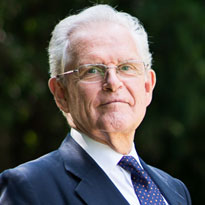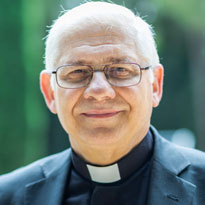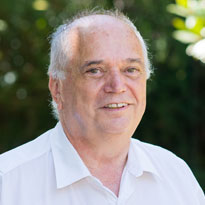Juan Antonio Pérez López Chair
Chair: John Almandoz
Juan Antonio Pérez López created a body of work that brings economic, sociological, anthropological and ethical elements together. Pérez López reminds us that people are not merely self-interested, driven by material wants, but also social beings, driven by intrinsic and transcendent motives. These transcendent motives can only be satisfied by contributing to the read needs of others.
For Pérez López, good leadership involves not only attaining business results but also developing people, and uniting an organization towards an inspiring purpose of serving people and society in its daily operations. This kind of leadership is transformative and results in greater unity and cohesion throughout the organization. His model of the firm is not only better than the neoclassical alternative, but it may also be the best hope we have to mend the future for a business world in need of transformation. As business leaders, we should seek to reconnect people. And even when we fall short of the ideal, we will still be better off for having tried.
In line with his broad and holistic perspective, the Juan Antonio Pérez López Chair is dedicated to bringing that perspective to contemporary questions, such as organizational purpose, multiple stakeholder management, environmental concerns, sustainability, artificial intelligence, and novel approaches to leadership and the design of work—including virtual work.
Our research deepens understanding of leadership, sustainability and competitiveness of different kinds of organizations (business, non-profit, family, etc.), using Juan Antonio’s anthropological paradigm. We are developing projects related to mission-driven organizations, the definition of corporate purpose and its implementation; the integration of corporate purpose with the personal purpose of colleagues and with the needs of society and the environment; and the balancing of multiple stakeholder priorities.
In addition to producing research on purpose, meaningful work, balancing leadership and strategic priorities, and business in the context of broader society, the Chair organizes symposia and international conferences and collaborates in IESE´s Executive Education programs and in IESE’s Alumni Learning Program. It collaborates with academic programs and institutes in other universities.
Research areas
- Developing leadership competencies
- Motivation and leadership in the XXI century
- Business leadership and governance amid societal crises
- Definition and Implementation of corporate purpose
- Transformation of organizations in uncertain contexts
- Institutional logics in society and organizational culture
Chair
John Almandoz is a professor in the Department of Managing People in Organizations. His background includes experience in actuarial consulting, corporate banking, and the management of non-profit organizations. He earned a joint PhD in Organizational Behavior and a master’s degree in Sociology from Harvard Business School/Harvard University and an MBA from Southern Methodist University’s Cox School of Business. He has published in prestigious journals such as the Academy of Management Journal and the Administrative Science Quarterly and participates in research in organizational theory, institutions, and top management teams and boards of directors. He is based at IESE’s New York campus.
Juan Antonio Pérez López: Publications
Books
Pérez López, J.A. (1991). Teoría de la acción humana en las organizaciones: la acción personal. Ediciones Rialp, SA.
Pérez López, J.A. (1994.) Fundamentos de la dirección de empresas. Ediciones Rialp, SA.
Pérez López, J. A., & Chinchilla, N. (1995). La mujer y su éxito. Eunsa.
Pérez López, J.A. (1998). Liderazgo y ética en la dirección de empresas: la nueva empresa del siglo XXI. Deusto.
Book chapters
Pérez López, J.A. (1987). La “laborem excercens” y la visión científica de la acción humana. En VV.AA., Fernando Fernandez Rodriguez (Coord.) Estudios sobre la encíclica Labórem Exercens. Biblioteca de Autores Cristianos. Pág. 267-294.
IESE Research papers
Pérez López, J. A. (1974). Organizational control theory: a formal approach. IESE Research Paper, WP nº 4.
Pérez López, J.A. (1974). Organizational theory: a cybernetic approach. IESE Research Paper, WP nº 5.
Pérez López, J.A. (1974). Anthropology and sociology: A cybernetical approach. IESE Research Paper, WP nº 6
Pérez López, J.A. (1996). Sociología y satisfacción del trabajo. IESE Research Paper, WP nº 306
Company and humanist notebooks
Pérez López, J.A. (1987). El sentido de los conflictos éticos originados por el entorno en que opera la empresa. Cuadernos Empresa y Humanismo, N° 4, University of Navarra, Pamplona.
Pérez López, J.A. (1990). El poder… ¿para qué?. Cuadernos Empresa y Humanismo, N° 29, University of Navarra, Pamplona.
Other articles
Pérez López, J.A. (1984). El hombre de empresa frente a la crisis actual. Revista de Egresados del PAD. Publicado en 2008.
Pérez López, J.A. (1988). Enfoque de la dirección de recursos humanos. IESE Research Paper, GP-NT-216
Pérez López, J.A. (1989). La filosofía y el mundo de los negocios. Boletín de la Sociedad Económica Matritense de Amigos del País.
Alcázar, M. (2005). Introducción al Octógono. Cuadernos Empresa y Humanismo, N° 93.
Alcázar, M. (2010). Las decisiones directivas: una aproximación antropológica al logro de aprendizajes positivos en la persona y las organizaciones. Tesis doctoral, Universidad de Navarra.
Alcázar, M. (2012). Dirección: motivaciones, motivos, vínculos y oportunismos. Quito, IDE.
Ariño, M.A. (2005). Toma de decisiones y gobierno de organizaciones. Deusto.
Alvarez de Mon, S. (2010). Paradigmas del liderazgo: claves de la dirección de personas. McGraw-Hill.
Argandoña, A. (2004). Unidad y éxito en las empresas, Occasional Paper, 05/3.
Argandoña, A. (2007). “Economics, ethics and anthropology”, in M.L. Djelic and R. Vranceanu, eds., Moral Foundations of Management Knowledge. Cheltenham: Edward Elgar,67-84.
Argandoña, A. (2008). Integrating ethics into action theory and organizational theory, Journal of Business Ethics, 78, 435-446.
Argandoña, A. (2008). “Anthropological and ethical foundations of organization theory”, in S. Gregg and J.R. Stoner Jr., eds., Rethinking Business Management. Examining the Foundations of Business Education. Princeton: The Witherspoon Institute, 38-49.
Argandoña, A. (2011). “Las virtudes en una teoría de la acción humana”, en P. Requena y M. Schlag, eds., La persona al centro del Magistero sociale della Chiesa. Roma: Edusc, 49-71.
Argandoña, A. (2011). “From action theory to the theory of the firm”, en J. Canals, ed., The Future of Leadership Development. Houndmills, UK: Palgrave Macmillan, 119-142 (también como Research paper, D-855-E, 2010).
Argandoña, A. (2015). Consistencia y ética en la toma de decisiones. Documento de Investigación IESE, WP-1128.
Argandoña, A. (2021). La empresa, una comunidad de personas. Cultura empresarial para un tiempo nuevo. Plataforma Editorial.
Ferreiro, P. (2013). El Octógono: un diagnóstico completo de la realidad empresarial. PAD-University of Piura.
Ferreiro, P. & Alcázar, M. (2002). Gobierno de personas en la empresa. PAD-University of Piura.
Melé, D. (2023). La interacción entre personas en la empresa:¿ pueden complementarse mutuamente los enfoques de Pérez López y Wojtyla?. Revista Empresa y Humanismo, 121-152.
Melé, D., Chinchilla, M. N., & López-Jurado, M. (2019). The “Freely Adaptive System”. Application of this cybernetic model to an organization formed by two dynamic human systems. Philosophy of Management, 18, 89-106.
Rosanas, J.M. (2008). Beyond economic criteria: a humanistic approach to organizational survival. Journal of Business Ethics, 78(3), 447–462.
Rosanas, J.M. (2012). Beyond Effectiveness: Attractiveness and Unity as Criteria For Decision-Making in Organizations. The European Business Review, January–February, 38–41.
Rosanas, J.M. (2013). Decision-Making in an Organizational Context: Beyond Economic Criteria. Palgrave Macmillan.
Revista de Antiguos Alumnos del IESE, nº 66, junio 1997, pág. 58. Es noticia en el IESE. In Memoriam. “Acto académico ‘In Memoriam’ del profesor Juan Antonio Pérez López”.
Revista de Antiguos Alumnos del IESE, nº 82, junio 2001, págs. 46-54. Josep Maria Rosanas, “La esencia de la dirección. Herbert Simon y Juan Antonio Pérez López. In Memoriam”.
Revista de Antiguos Alumnos del IESE, nº 102, septiembre 2006, págs. 38-42. Josep Maria Rosanas, “¿Qué cosas diferentes dijo Juan Antonio Pérez López?”.
Revista de Antiguos Alumnos del IESE, nº 143, octubre 2016, pág. 45. “Homenaje al profesor Juan Antonio Pérez López (1934-1996). El lado humano de la toma de decisiones”.
Chinchilla, N., Pérez López, J. A. (1991) Social effectiveness and self-control. FHN-232-E.
López-Jurado, M., Jimenez, E., Chinchilla, N. (2014). Juan Antonio Pérez López and Corporate Leadership. DPON-120-E.
Pérez López, J. A. (1975). Teoría cibernética de la organización: Las diferentes órdenes de sistemas. FHN-108.
Pérez López, J. A. (1975). Teoría de las organizaciones humanas: Las funciones del sistema informal. FHN-106.
Pérez López, J. A. (1985 ). Human Motivation. FHN-161-E.
Pérez López, J. A. (1986). Business or Enterprise? Different Approaches for the Management of People in Organizations. FHN-167-E.
Pérez López, J. A. (1986). Human work in business organizations. FHN-172-E.
Pérez López, J. A. (1991) Power… for what purpose? TDN-85-E.
Pérez López, J. A., Melé, D. (1991) What is Being Ethical? TDN-86-E.
Pin Arboledas, J. R, Pérez López, J. A (1988) El supervisor de primera línea. El capataz: ¿un hombre en medio? FHN-193.
Pin Arboledas, J. R. , Almandoz, J., Chinchilla, N. (2023). Human Motivation at Work: A Paradigm for Purpose-led Organizations. DPON-361-E.
Vázquez-Dodero, Juan Carlos (10/1997). Orderly Thinking: How to Deal With Prudential Problems. ASNN-5.-E.





